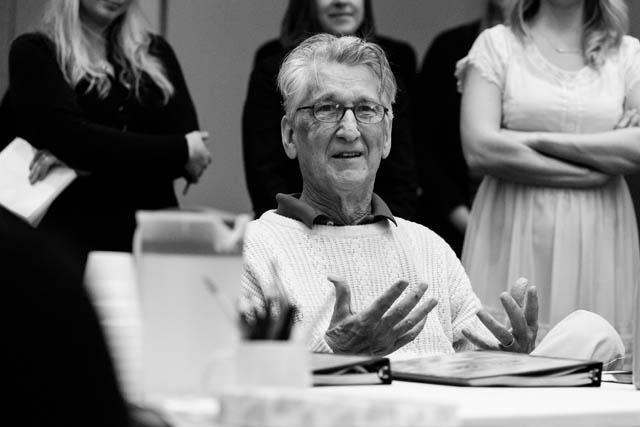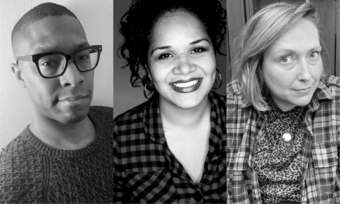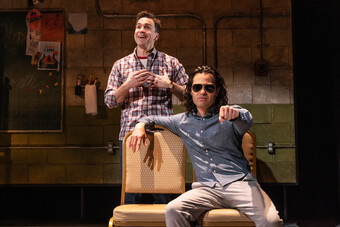Sometimes Mount Vesuvius Erupts
An Interview with Chuck Mee
When Charles Mee writes plays, he draws heavily from existing literature, critical theory and other plays, particularly those of Ancient Greece.
This interview was conducted related to the University of Iowa Theatre Department’s staging of his critically acclaimed play, Big Love. This telephone interview originally took place on February 29, 2012.

What is theatre to you? Why are you drawn to it?
Oh gosh, I don’t know. I think when I was five years old coming home from the playground, I thought “Oh, when he said that I should have said this, and then he would have said that, and then so I would have said this. So I think I started writing plays in my head when I was about five. And then when I was a teenager, my mother took me down to Chicago to see South Pacific. And in the middle of South Pacific there’s a guy who has a sailing ship tattooed on his stomach. And he did a belly dance that made the ship rock on the waves. And I thought, “I want to do that.”… So I’m afraid that’s as profound as my motivation ever became.
Your plays don’t necessarily use conventional format or structure, but they result in really incredibly theatrical events. Why plays? Why not short fiction or poetry or film or something else?
I just love the theatre. I’m just crazy about it. Out of college I was writing for the theater. And then, in the sixties, I got caught up in anti-Vietnam War politics, and wrote political polemics for about twenty-five years. And then critics kept saying “His history books read like novels.” So, I thought “I’ll write a novel!” I lived off credit cards for a year and I wrote a novel. And then the doorbell rang, and I was given a piece of pink paper that said the sheriff would come the following week to auction off my furniture for the non-payment of taxes. And I thought, “This is the low point in my life.” I went back and read the novel, and I thought it was horrible. I took it out to the garbage can on the street and I threw it away. Then the next morning I woke up and I thought “Oh that was stupid because there was stuff in there I wanted to remember just for my own life. While I still remember some of it I’ll make some notes.” And the notes took the form of a trilogy of one act plays. Then I thought “I see, if I just write what I love for myself, this is the form it takes. So, that’s what I’m going to do now.”
You’ve said “There is no such thing as an original script.” what does authorship mean to you and how do you approach composing a play?
Well, I do think that everything is simultaneously a product of the culture and of an individual’s psyche. So that everything is both stolen and original at the same time in a way. And so, authorship is the culture going through a single psyche and coming out a little bit differently. But that doesn’t quite constitute total ownership or total originality.
Well I think that’s like life. Things just happen in life sometimes. When we talk about it, we think we can understand cause effect, cause effect, cause effect. And we think we can impose that logic on life or reconstitute a description of life that is rational and can be explained in that way. But sometimes Mount Vesuvius erupts and that’s just what happens.
It seems that your relationship with Laurie Williams greatly influence your writing of Big Love, True Love and First Love. Do you think it’s possible to distinguish between our personal life and our art or do you think these things are conflated?
Well, I do think it’s possible to distinguish between the two, but obviously they invade each other all the time.
What is your favorite cocktail, your favorite Italian dish and your favorite sex position?
My favorite cocktail is a cup of tea. It would have to be at least two or three different Italian dishes: ravioli, penne, and more ravioli. And favorite sexual position, I can’t think of one that isn’t my favorite.
The format of Big Love on the page looks almost as if it were written in verse. Should an actor use this format in a specific way when delivering the text?
Well, it open to interpretation, but it’s not supposed to be verse really it’s just It’s just the way I Think and feel As you hear me talking on the phone I get to the end of a phrase and Sometimes in the idle of it I stop To think And that’s a new line And so If every time you stop to Take a breath or Think about what your next word will be or Change your mind about something Or have A secondary thought or a contradictory thought That’s another line So I think of those lines of text as being just the way we think and speak. Or the way that particular character thinks and speaks.
Many things seem to materialize out of nowhere in Big Love. The fifty sisters suddenly arrive, the grooms suddenly die—they all materialize in this very exciting way. What are your thoughts on these quick shifts in the play?
Well I think that’s like life. Things just happen in life sometimes. When we talk about it, we think we can understand cause effect, cause effect, cause effect. And we think we can impose that logic on life or reconstitute a description of life that is rational and can be explained in that way. But sometimes Mount Vesuvius erupts and that’s just what happens.














Comments
The article is just the start of the conversation—we want to know what you think about this subject, too! HowlRound is a space for knowledge-sharing, and we welcome spirited, thoughtful, and on-topic dialogue. Find our full comments policy here
This is a great interview, Sarah!